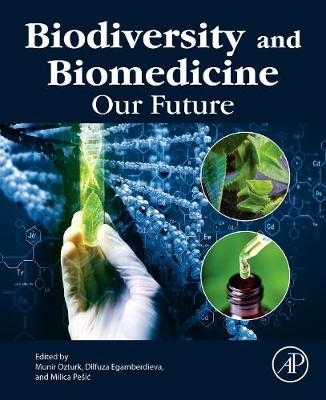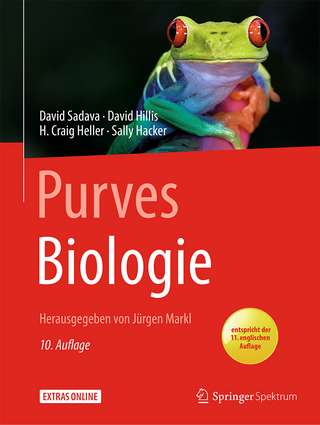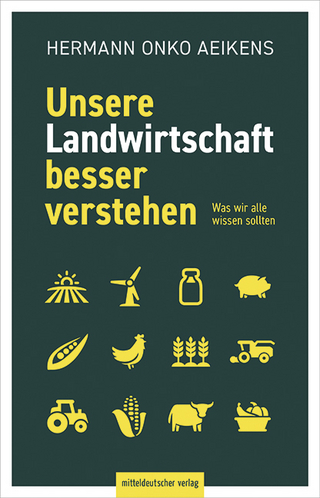
Biodiversity and Biomedicine
Academic Press Inc (Verlag)
978-0-12-819541-3 (ISBN)
Written by leading biodiversity and biomedical experts, the book begins with new insights on the benefits of biologically active compounds found in fungi and plants, including a chapter on the use of wild fruits as a treatment option. The book goes on to discuss the roles of animals, such as amphibians and reptiles, and how the threatened presence of these species must be reversed to conserve biodiversity. It also discusses marine organisms, including plants, animals, and microbes, as essential in contributing to human health.
Biodiversity and Biomedicine: Our Future is a vital source for researchers and practitioners specializing in biodiversity and conservation studies. Students in natural medicine and biological conservation will also find this useful to learn of the world’s most bio-rich communities and the molecular diversity of various species.
Dr Munir Ozturk is the Founder Director for the Centre for Environmental Studies, as well as previous Chairman of the Botany Department, both Ede University, Turkey. He is Vice President of the Islamic World Academy of Sciences, Jordan. Dr Öztürk has received fellowships from Alexander von Humboldt, and the Japanese Society for Promotion of Science. He has worked at the University of Chapel Hill, North Carolina, via a grant from National Science Foundation, USA. He also worked as a consultant fellow at the Faculty of Forestry, University Putra Malaysia and as a “Distinguished Visiting Scientist at the ICCBS, Karachi University, Pakistan. His fields of scientific interest are; Biomonitoring, Plant Eco-Physiology, Conservation of Plant Diversity, Biosaline Agriculture, Pollution and Medicinal/Aromatic Plants. He has acted as guest editor for several international journals like; The Malaysian Forester, Environmental Geology – Springer, Science and Business Media, Journal of Environmental Biology (4 volumes), Procedia Social and Behavioral Sciences, Elsevier (2 Volumes). Dilfuza Egamberdieva is a research associate at the Centre of Agricultural Landscape Research, Germany and head of Joint Uzbek-China Key Lab of Ecobiomes of Arid Lands, National University of Uzbekistan. Her research interests include microbial ecology and diversity, plant-microbe interaction, plant nutrition and stress tolerance, and plant biological disease control. She has been awarded the SCOPUS-2019 Award “Top Scientist of the Year, TWAS (The World Academy of Science) Award in Agricultural Sciences (2013), and TWAS-TWOWS-SCOPUS Young Women Research Award (2009), as well as several Fellowships such as President’s International Fellowship for Visiting Professors (PIFI), The Chinese Academy of Sciences (CAS), and the Georg Forster Research Fellowships, Alexander von Humboldt Foundation. She is a member of several journals’ editorial board, authored seven books published by Elsevier and Springer, and co-authored over 200 publications in per reviewed journals. Dr. Pesic is the Head of the Department of Neurobiology at the Institute for Biological Research "Siniša Stankovic"- National Institute of Republic of Serbia, University of Belgrade. The primary focus of her research is the development of small molecules targeting mechanisms of cancer multidrug resistance. Her works show that natural compounds can have an important role in overcoming multidrug resistance. She has been involved in cancer research for more than 20 years, and during her career, she has published more than 70 peer-reviewed papers in reputable journals and authored 7 book chapters.
1. Plant microbiome: source for biological active compounds 2. Chemodiversity in natural plant populations as a base for biodiversity conservation 3. Harnessing the Potential of Plant Biodiversity in Health and Medicine: Opportunities and Challenges 4. Biomining Fungal Endophytes from Tropical Plants and Seaweeds for Drug Discovery 5. Biomedicine developments based on marine biodiversity: Present and Future 6. Superbugs, Silver bullets and new Battlefields 7. The benefits of active substances in amphibians and reptiles and the jeopardy of losing those species forever 8. Human genetic diversity in health and disease 9. Potential for cancer treatment: natural products from The Balkans 10. Biodiversity of wild fruits with medicinal potential in Serbia 11. Some Botanicals from the Himalayas with Anticancer Potential 12. Diversity and bioprospect significance of macrofungi in the scrub jungles of southwest India 13. Mushroom and plant extracts as potential intervening supplements in diabetes management 14. Anticancer activities of marine macroalgae: status and future perspectives 15. Insights into the Bioactive Compounds of Endophytic Fungi in Mangroves 16. Essentiality of Mint: Current Understanding and Future Prospects 17. Azadirachta indica: The Medicinal Properties of The Global Problems Solving Tree 18. Advancements in plant transgenomics approach for the biopharmaceutics and vaccines production 19. Secondary Metabolites from Endangered Gentiana, Gentianella, Centaurium, and Swertia species (Gentianaceae): Promising Natural Biotherapeutics 20. Grape (Vitis vinifera L.): health benefits and effects of growing conditions on quality parameters 21. Flavonoids in Cancer Therapy: Current and Future Trends 22. Personalized Biomedicine in Cancer: From Traditional Therapy to Sustainable Healthcare 23. Tumor-Specific Genetic Profiling and Therapy in Biomedicine 24. Vascular and bone marrow explant models to assess in-vitro haematotoxicity of herbal extracts. 25. Nature-inspired synthetic analogues of quorum sensing signaling molecules as novel therapeutics against Pseudomonas aeruginosa infections 26. Commodification of Biodiversity: Promises and Pitfalls
| Erscheinungsdatum | 02.07.2020 |
|---|---|
| Verlagsort | San Diego |
| Sprache | englisch |
| Maße | 216 x 276 mm |
| Gewicht | 1540 g |
| Themenwelt | Naturwissenschaften ► Biologie |
| ISBN-10 | 0-12-819541-X / 012819541X |
| ISBN-13 | 978-0-12-819541-3 / 9780128195413 |
| Zustand | Neuware |
| Haben Sie eine Frage zum Produkt? |
aus dem Bereich


